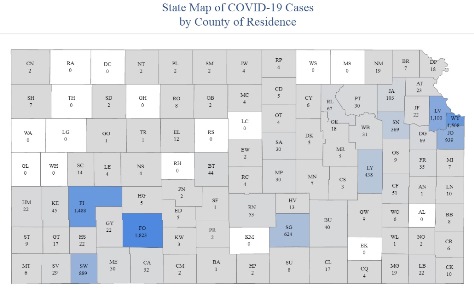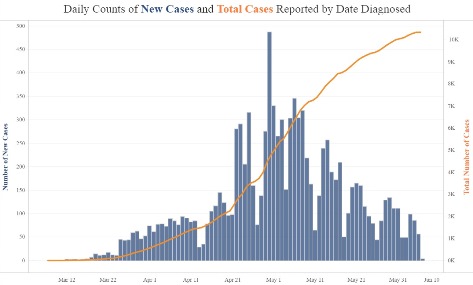

Gov. Laura Kelly today called for a task force to review and determine how the state can assist Kansans who need rental emergency assistance and home mortgage assistance.
The governor said during a 4 p.m. news conference Friday that new legislation forced her to let go of the executive order prohibiting mortgage foreclosures and evictions.
She said the unemployment claims being filled by the Kansas Department of Labor, which has processed close to $1 billion in unemployment benefits in the state, should help with this need, and also the transition to reopening the economy should help Kansans get the resources they need.
“I know the economic impact of this virus has been brutal for homeowners and renters alike,” Gov. Kelly said.
She said she would explore an emergency rental and home mortgage assistance program through asking the S.P.A.R.K. reopening task force to review and determine the most feasible option for the state. She has asked the recovery team to make it a priority, she said.
The governor also said she planned to sign the coronavirus bill recently passed by the Legislature. She also said she supports a review and modernization of the Kansas Emergency Management Act.
Recommendation for most local communities to reopen
The state’s reopening plan called for Phase 3 to start no later than June 8. The governor’s emergency disaster declaration issued two weeks ago transferred reopening decisions back to the local level, the governor said. The state health department continues to monitor health metrics every day and supports local communities in a safe, gradual transition, she said.
All three key health metrics – disease spread, hospitalization and testing capacity – generally continue to trend downward, according to state health and emergency officials, and they recommend most local communities may move into Phase 3, she said. However, counties that are on a plateau or are increasing should not feel pressured to move into Phase 3, but can remain in Phase 2 until there is improvement, she said.
Wyandotte County will move into Phase 3 on Monday, June 8, according to local health officials at the June 4 Unified Government Commission meeting.
“We strongly encourage local communities to adhere to Phase 3 recommendations that mass gatherings remain limited to 45 individuals or fewer,” Gov. Kelly said.
Those who travel should follow KDHE travel and quarantine guidelines, she said. The virus is highly transmissible, it has a long incubation period and cases are frequently asymptomatic, she said. Without proper precautions, both mass gatherings and travel have the potential to greatly increase the chance of community spread, she said. Personal responsibility will be critical to keeping communities safe, she added.
All businesses, regardless of size, are strongly urged to continue following fundamental cleaning and public health practices, as stated by KDHE, she said. All businesses should follow industry-specific guidelines, outlined at https://covid.ks.gov/. She said people should continue to stay home if they feel sick, wash their hands frequently, continue to practice social distancing and protect themselves and others by wearing masks.
“I know life is beginning to feel a little more normal, but we are not out of the woods yet,” Gov. Kelly said. Businesses, parents and communities have made sacrifices to reach this point, and she encouraged them to continue good health practices so those efforts were not in vain.
Governor holding dialogue with black leaders
Gov. Kelly also said she wanted black Kansans to know that she is listening, and she is committed to using the power and privilege granted by the people of Kansas to help ensure this moment becomes a catalyst for structural change.
This week she said she and leaders in the black community have talked about what actions need to be taken in the state. She said it needs to be multi-faceted and needs to confront more than just problems in policing. She said this effort will take time.
Gov. Kelly also asked people to take precautions as they exercise their constitutional rights. She urged people to wear masks, continue social distancing, and if they have been to a protest, to get tested for COVID-19.
New outbreaks in education settings and at a jail
Kansas had 10,393 positive cumulative COVID-19 cases on Friday, an increase of 223 since Wednesday. There were a total of 232 deaths, an increase of 10 since Wednesday.
Dr. Lee Norman, Kansas secretary of health and environment, said although positive cases have been increasing, the metrics look good.
“The virus is not gone, but the trend lines are improving,” he said.
Kansas has 145 clusters of cases, with 101 still active, which accounted for 5,391 cases and 163 deaths, according to the KDHE.
According to KDHE statewide statistics, Kansas has one more death since Wednesday in corrections clusters, which increased from six to seven. There also were 10 more cases and one more deaths in gathering clusters; 39 more cases in group living clusters; 37 more cases and six more deaths in long-term care clusters, which increased by three; 66 more cases and two more deaths in meatpacking clusters; and 51 more cases, one more death and four more clusters in private industry.
In addition, day care and school clusters went from one to two, increasing from two cases to four cases. The two new cases were reported in staff in Ford County, he said. There are teams working on recommendations for schools in the fall, he added.
Dr. Norman said the health department received a call from a county jail about two positive cases in law enforcement. The state health department team responded in less than 24 hours, traveled there, and tested the 220 law enforcement officers and offenders. He said this sort of situation could be the new norm.
The Unified Government’s COVID-19 web hub recently identified a new outbreak in Wyandotte County at VVF, 1705 Kansas Ave., Kansas City, Kansas, where there were six positive COVID-19 cases. The first cases were reported June 2, according to the website.
Two cases of multi-system inflammatory syndrome in Kansas
On the topic of multi-system inflammatory syndrome, Dr. Norman said two young Kansans have been in Children’s Mercy Hospital with this syndrome. While the syndrome is rare, a small percentage of COVID-19 child patients have gotten the syndrome a few weeks later.
The multi-system inflammatory syndrome may cause inflammation or infection of blood vessels, and has affected the kidneys, heart and blood vessels, and caused strokes even in young people, he said.
Dr. Norman said two infants, one 2 months old and one 4 months old, had been reported with active COVID-19 infection.
“We cannot let our guard down and cannot make the assumption that children get off scot-free from this,” Dr. Norman said. “They don’t.”
He said they are continuing to learn more about the coronavirus, gaining more understanding about the physiology of it.
To see the governor’s news conference, which has more information, visit https://www.facebook.com/GovLauraKelly/videos/1121820861538010/.
The state’s COVID-19 website is at https://covid.ks.gov/.
The UG’s COVID-19 information page is at https://alpha.wycokck.org/Coronavirus-COVID-19-Information.
Wyandotte County is currently under the state’s Phase 2 plan and will change to Phase 3 on Monday. See covid.ks.gov.
The state plan’s frequently asked questions page is at https://covid.ks.gov/wp-content/uploads/2020/05/Reopening-FAQ_5.19.2020_Final.pdf.
Test sites are listed at https://wyandotte-county-covid-19-hub-unifiedgov.hub.arcgis.com/pages/what-to-do-if-you-think-you-have-covid-19.
The CDC’s COVID-19 web page is at https://www.cdc.gov/coronavirus/2019-nCoV/index.html.
